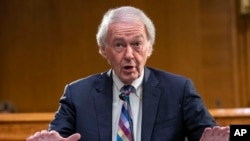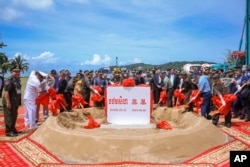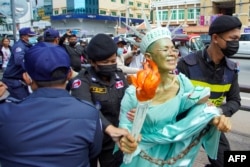WASHINGTON — A bipartisan group of U.S. lawmakers are reintroducing a sanctions bill targeting Cambodia’s leaders about a week before the country’s largely preordained national elections.
The Cambodia Democracy and Human Rights Act would sanction Cambodian leaders involved in attacks on democracy and human rights abuses, as well as increasing scrutiny of Phnom Penh’s ties to Beijing.
Sen. Ed Markey (D-Mass) announced the legislation on Friday, along with Sens. Dick Durbin (D-Ill.) and Marco Rubio (R-Fla.) and Reps. Chris Smith (D-N.J.) and Lori Trahan (D-Mass.).
“On the eve of Cambodia’s general election, the Cambodia Democracy and Human Rights Act reaffirms America’s support for free, fair elections and the upholding of democratic values in Cambodia,” said Trahan, who chairs the Congressional Cambodia Caucus.
“Prime Minister Hun Sen and his cronies have continued to undermine democracy and violate human rights,” added Markey. “The United States must send a clear message that we will not waver in our commitment to supporting the people of Cambodia and their constitutional right to democracy.”
The bill lists three broad categories of sanctionable activities, all of which would result in an individual’s assets being blocked in the United States.
It asks the president to submit a list to Congress within 180 days of the bill passing that identifies Cambodians who “directly and substantially prevent” opposition parties, the media or civil society groups from “exercising their civil and political rights.”
It also targets individuals who “engage in or are responsible for any acts” that fall under the Global Magnitsky Human Rights Accountability Act, which applies to gross violations of human rights and corruption.
And the bill seeks to sanction those who “engage in or support the establishment of installations or facilities” that could be used by China’s military or affiliated entities.
The U.S. has long expressed concern about China’s involvement in construction on and around the Ream naval base on Cambodia’s coast in the Gulf of Thailand. Some military leaders are already under American sanctions over alleged corruption related to the base.
Individuals found in violation of the Cambodia Democracy and Human Rights Act would be barred from conducting any financial transactions in the U.S. and would have their visas blocked or revoked.
The bill allows exceptions in case of national security interests or international obligations, which may, for example, allow senior officials to attend United Nations summits despite being on the list.
Phay Siphan, a Cambodian government spokesman, called the bill “politically motivated” and said the U.S. was “afraid that we are close to China.”
“It’s due to confusion among US politicians,” he told VOA Khmer of the legislation, adding it was meant to “create a political scene ahead of the election.”
Rubio and Smith specifically cited U.S. concerns over Cambodia’s relationship with China in his statement on the legislation.
“Under Hun Sen’s authoritarian grip, Cambodia is being exploited by China’s genocidal regime. This bipartisan and bicameral bill would push for accountability in support of the Cambodian people,” Rubio said.
“Our legislation seeks to counter both despotism within the country and the imperialistic ambitions of Xi Jinping’s China,” added Smith.
Durbin also mentioned the case of Theary Seng, a Cambodian-American human rights activist who was jailed last year on incitement charges largely based on her social media posts in support of longtime opposition leader Sam Rainsy.
The Senate Foreign Affairs Committee advanced a previous version of the Cambodia Democracy and Human Rights Act shortly after her conviction in June 2022. At the time, Markey’s office told VOA Khmer that he expected the bill to reach President Biden’s desk by the end of the year.
However, the bill didn’t receive a floor vote in the previous Congress, meaning it now needs to restart the process in the current Congress.
There is little chance that it will move ahead of Cambodia’s election on July 23.
Not only has Cambodia’s government ignored calls to restore the political rights of Cambodian opposition leader Kem Sokha ahead of the ballot, the quasi-independent elections body has blocked the main opposition Candlelight Party from participating over clerical issues.
The bill would likely roil U.S. relations with Hun Sen’s government as he orchestrates a transfer of power to his son, Gen. Hun Manet, who for the first time is running for parliament in this election. The prime minister has indicated he plans to hand power to his son in the next five years, before 2028 national elections.






